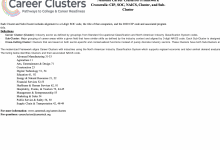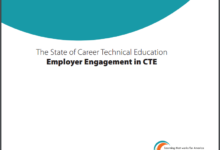Measuring skill attainment can help states improve program quality, streamline connections between secondary and postsecondary programs, and communicate to employers the value of Career Technical Education (CTE) programs. While the Strengthening Career and Technical Education for the 21st Century Act (Perkins V) no longer requires states to collect and report data on technical skill attainment, eight states are continuing to measure technical skill attainment in their Perkins accountability systems, and several others will continue to use the assessments they developed under previous iterations of the federal law. Minnesota’s Technical Skill Assessment (TSA) project, which was launched in 2009 and has since expanded to encompass 79 Career Pathways, demonstrates how states can develop a strong assessment framework by engaging the employer community and aligning secondary and postsecondary systems.
In 2009, the Minnesota Department of Education and the Minnesota State Colleges and Universities System formed a joint partnership to review five of the state’s 79 CTE Career Pathways. The purpose of the review was to identify the core competencies of each Career Pathway and determine whether or not existing assessments could adequately measure those competencies for students in the programs. The five Career Pathways in the pilot project were selected based on enrollment and alignment to high-wage, high-demand career fields. They include: Business, Financial Management and Accounting; Health Therapeutic Services; Law Enforcement; Network Systems; and Plant Systems.
While the Minnesota State Colleges and University System is the Perkins eligible agency in Minnesota, the state rolled out a joint implementation strategy in 2008 that established 26 regional consortia made up of at least one 2-year college and one secondary school district. Each consortium jointly dictates how Perkins funds are expended. Under the TSA project, these consortia would be the vehicles for reviewing Career Pathways and identifying assessment needs. Once the Career Pathways were selected for the project, the state invited partners from its 26 consortia to nominate teachers and faculty to serve on Career Pathways work groups, which were tasked with the following:
- Identifying the essential competencies that should be taught, and tested, at the secondary and postsecondary level for each Career Pathway;
- Determining whether or not existing assessments are appropriate for measuring such competencies;
- Developing an assessment blueprint — a document that broadly defines what should be tested and how; and
- Providing recommendations for how the state should proceed in developing an assessment system.
Under the pilot program, the state of Minnesota also conducted an online survey of CTE teachers, consulted with other states, and reached out to assessment providers to determine which technical skill assessments were readily available. These were compiled into an inventory of third-party assessments that was later used to match assessments with Career Pathways.
The core structure of the pilot project was retained as the state scaled implementation of the TSA project more broadly. Starting in 2010, Minnesota added an additional six Career Pathways to the assessment review, convening groups of Subject Matter Experts (SME) to conduct the review. Each Career Pathway SME group included five or more teachers, faculty or industry personnel from at least three different consortia.
A Lead Consortium was selected from among the state’s 26 regional consortia to oversee the activities of each Career Pathway SME group. Under the Lead Consortium, SME groups identified core competencies, developed an assessment blueprint, and evaluated potential assessments in the state’s assessment inventory for each Career Pathway. Once this review was completed, the members of the Career Pathway SME group provided recommendations for how the state should proceed, either by adopting or modifying an existing assessment or developing one anew. To validate the recommendations of the SME work groups, the Lead Consortium gathered input from a broad cross-section of teachers, faculty, and business and industry leaders from across the state.
Using recommendations from these expert work groups, Minnesota developed and published a list of technical skill assessments, along with the core competencies for each Career Pathway, that can be used at both the secondary and postsecondary level. The state reviews and updates these assessments every five years, using teacher ratings of difficulty, alignment, length of time and ease of administering. The state also reviews assessments to ensure they are valid and reliable measures of student skill attainment.
Policy in Action
Minnesota initiated the TSA project with a pilot review of five Career Pathways in 2009. The pilot was scaled in subsequent years to encompass five additional Career Pathways in Fiscal Year 2010, eight Career Pathways in FY11, 25 Career Pathways in FY12, 21 Career Pathways in FY13 and the remaining 15 Career Pathways in FY14. To date, Minnesota has identified core competencies and published reliable and valid assessments for 79 Career Pathways available in the state. The state reports that, over the course of the project, more than 600 teachers and faculty weighed in on, and some 200 business and industry leaders reviewed and validated, core competencies and assessments.
Skill assessment data are used at the local level to drive program improvement activities. The state periodically releases a report of assessment data by Career Pathway and provides technical assistance training to regional consortia through the CTE Data Driven Improvement model to ensure teachers and faculty are able to leverage assessment data to make appropriate modifications to curriculum and instruction.
Minnesota provides additional technical assistance to teachers and faculty through annual technical skill assessment orientation workshops and through a Technical Skill Assessment Handbook. These resources help educators become familiar with the core competencies in each Career Pathway and prepare them to administer assessments in their programs.
Related Links
- Website: The Minnesota CTE Assessment Project
- Resource: Background Report on Minnesota CTE Assessment Project (2009)
- Resource: Minnesota Career Fields, Clusters and Pathways (2016)
- Resource: Minnesota Technical Skills Assessment Handbook (2012)
- Resource: Criteria for State-Approved Technical Skills Assessment (2019)
- Resource: Minnesota Position on Technical Skill Assessment Implementation (2017)
Last Updated March 2021






